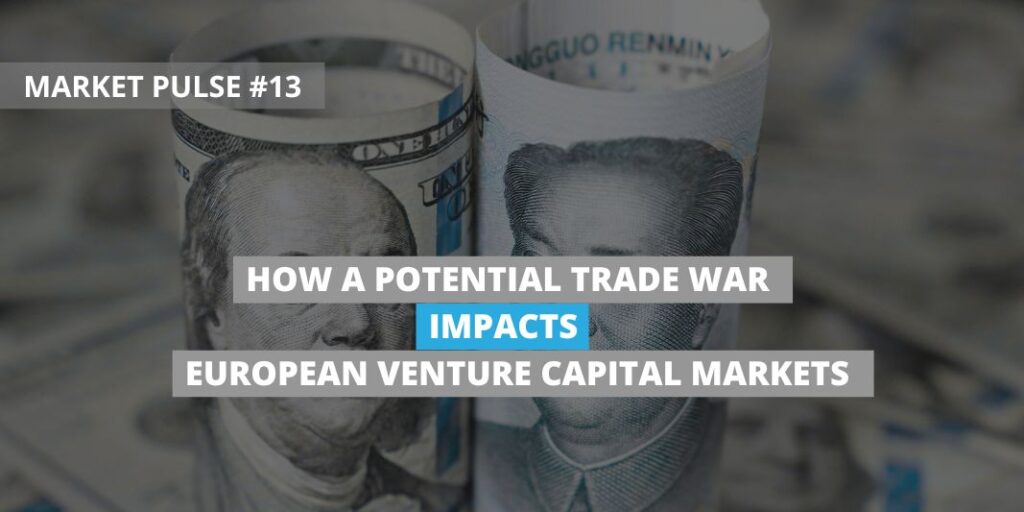A Temporary Truce, but Uncertainty Remains
Recent geopolitical developments have put the global economy on edge. President Donald Trump has agreed to pause the imposition of 25% tariffs on Canada and Mexico for 30 days, temporarily averting an economic showdown with its North American neighbors. Canada, in turn, has committed to reinforcing its border to curb migration and fentanyl trafficking, while Mexico has deployed troops to its northern border in exchange for the US limiting the flow of guns into Mexico. However, tensions remain high, as a 10% tariff on Chinese imports has taken effect, leading Beijing to retaliate with its own set of tariffs, including 15% on coal and liquefied natural gas and 10% on crude oil and agricultural machinery.
While these developments primarily impact North America and China, they hold significant implications for Europe—particularly for European venture capital (VC) markets. If a trade war emerges, it could lead to investment shifts, supply chain realignments, and increased volatility, all of which could reshape how capital flows into European startups.
How a Trade War Could Affect European VC Markets
-
Increased Investment Diversion to Europe
With escalating trade tensions between the US and its key partners, global investors may look to Europe as a more stable alternative. The European market’s relatively consistent trade policies could make it a preferred destination for capital that might otherwise have been allocated to North America or China.
- European startups, particularly in technology, manufacturing, and consumer goods, could attract more funding as investors seek alternatives to US-China supply chains.
- VC firms looking to hedge against North American volatility may shift their focus to promising European innovations.
-
Supply Chain Realignment Could Benefit European Startups
Tariffs on North American and Chinese trade could push companies to reconfigure their supply chains, which would open new opportunities for European startups in logistics, automation, and alternative supply solutions.
- Startups specializing in AI-driven logistics, nearshoring solutions, and supply chain automation may see increased demand.
- Europe-based manufacturers and fintech firms facilitating alternative trade routes may benefit from the restructuring of global supply chains.
-
More Expensive US Imports Could Favor European Competitors
Higher tariffs on US goods would increase costs for American exports, making European companies more competitive in global markets. This could create growth opportunities for European startups that compete with US firms in regions like Asia and Latin America.
- European tech and consumer startups may gain market share as price-sensitive buyers opt for non-US alternatives.
- Sectors such as renewable energy, automotive, and digital commerce could experience a surge in demand as US competitors struggle with tariff-driven price increases.
-
Market Volatility and Risk Aversion
A worsening trade war could have destabilizing effects on the global economy. A 1.2% projected GDP hit in the UScould lead to investor caution, affecting capital flow into high-risk European startups.
- Early-stage startups in high-risk sectors like deep tech and biotech could find it harder to raise funds.
- However, risk-averse investors may prioritize resilient sectors such as AI, cybersecurity, and renewable energy, where Europe has strong market positioning.
-
A Stronger Euro and New Trade Agreements
If trade tensions weaken the US dollar, the Euro could strengthen, boosting purchasing power for European startups. Additionally, new trade agreements within Europe could enhance market access and investor confidence.
- European startups may find it easier to import resources and expand into regions previously dominated by US companies.
- Trade realignments could redirect VC investment to sectors benefiting from Europe’s more stable trading environment.
The Bottom Line: A Mixed But Potentially Positive Outlook for European VC
While a full-scale trade war remains uncertain, its effects on European venture capital markets could be a double-edged sword. On one hand, increased investment inflows, supply chain realignment, and European competitiveness could create a boom for startups and VC firms. On the other, market volatility and cautious investor sentiment could pose challenges, especially for high-risk sectors.
Ultimately, Europe has the potential to emerge as a relative winner, attracting capital from investors seeking stability and opportunities beyond US-China tensions. However, flexibility, adaptability, and strategic planningwill be key for VC firms navigating this evolving landscape.

